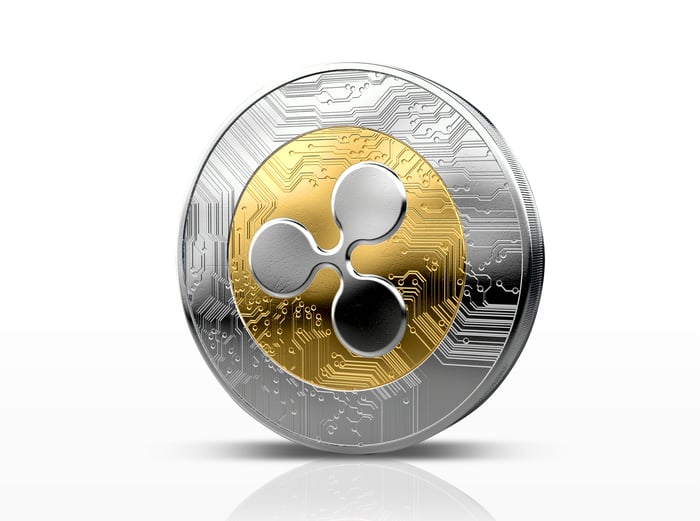Despite a few hiccups toward the end of the year, this has still been, unquestionably, the year of the cryptocurrency. Whereas the stock market has historically delivered 7% annual gains, inclusive of dividend reinvestment, and when adjusted for inflation, the aggregate increase in the value of all cryptocurrencies combined has left it in the dust.
Having begun the year at $17.7 billion in combined market cap, the aggregate value of approximately 1,380 cryptocurrencies as of Dec. 25 was $542 billion. That's an increase of almost 3,000% since the year began, and it's a big reason retail investors have plowed into cryptocurrencies head first.

Image source: Getty Images.
Make no mistake about it: This rally is about blockchain
Though there are actually no shortage of reasons behind the virtual currency rally, most tend to lead back to a single source: the emergence of blockchain technology. Think of blockchain technology as the infrastructure that underlies the virtual coins that investors have been buying. Blockchain is the digital, distributed, and decentralized ledger that's responsible for recording all transactions without the need for a third-party intermediary, which is often a bank. It tends to offer three decisive advantages over the networks involved in money transmittance today.
First, as noted, information on a blockchain is decentralized. Rather than being stored in a data center, which could be at risk of being attacked by a cybercriminal who could then cripple a virtual currency, information is sort of piecemealed on servers and hard drives all over the world. This virtually eliminates the opportunity for cybercriminals to bring a cryptocurrency to its knees. Long story short, it may be more secure than existing networks.
Second, it could also be a whole lot cheaper. Remember, blockchain cuts out the middleman, which is usually a financial institution. If that middleman doesn't have to be paid, there's a good chance that transaction fees could actually go down over time as this technology is improved. It's unclear if this means lower fees for consumers, but it appears to suggest a modest boost in the bottom lines for enterprises that adopt blockchain technology for their money-transmittance needs.
Finally, but possibly most important of all, blockchain technology offers the ability to significantly speed up transaction settlement times. With the proofing of transactions occurring 24 hours a day, seven days a week, and blockchain technology not having to adhere to the "normal work week" as defined by today's financial institutions, the days of multi-day holds on cross-border transactions may be coming to an end.

Image source: IBM.
These Dow components have welcomed blockchain with open arms
It's this blockchain technology that's really exciting some of the biggest U.S. multinationals. In fact, three blue-chip Dow Jones Industrial Average (^DJI -0.12%) components are getting their hands wet in blockchain-based projects right now.
IBM
Big Blue, as IBM (IBM -0.35%) is occasionally called, missed the boat pretty badly when cloud-computing became the new means for businesses to store and share data, and it's been playing catch-up ever since. However, it has a genuine shot to be at the leading edge of the curve with regard to blockchain technology.
In October 2017, Stellar (formerly Stellar Lumens) announced a partnership with KlickEx and IBM to provide IBM a means to quickly and cheaply facilitate its cross-border transactions. Remember, IBM generated nearly $80 billion in full-year sales in 2016, and tens of billions of these dollars are coming from overseas markets.
Under the agreement, a dozen international banks in the South Pacific region will be developing and deploying Stellar's blockchain technology to quickly process transactions, as well as integrate the different currencies of the South Pacific countries. Though it's a project that's being rolled out in a single region, Stellar's blockchain would be easily scalable to other parts of the world. With payments being processed within two to five seconds, and for a cheaper cost than with current networks, it looks to be a win for IBM and its clients.

Image source: Getty Images.
American Express
Don't leave home without it! American Express (AXP -0.31%), which had fallen into a rough patch of its own following its break-up with longtime business partner Costco in 2016, is among the leading pioneers in the banking space when it comes to blockchain technology.
In November 2017, American Express and Banco Santander (SAN 1.97%) announced that they'd be partnering with Ripple to make instantaneous cross-border transactions a real thing. According to the agreement, non-card payments made through AmEx's FX International Payment network to U.K. Banco Santander accounts will be processed instantly through Ripple's blockchain technology, meaning no more multi-day holdups. Though this represents just a test for now, AmEx, like IBM, could roll this out to new regions and partners in the future.
What's more, it may give Ripple the opportunity to showcase what its coin, the XRP, can do. Aside from just thinking of these virtual coins as a means to buy goods and services, the XRP may offer the ability to act as an intermediary currency in cross-border transactions. For example, changing U.S. dollars into British pounds could be completed instantly by first converting dollars to XRP, then the XRP into British pounds. Best of all, the cost to do this may be cheaper than current networks.

Image source: Getty Images.
Cisco Systems
Even the king of connectivity, Cisco Systems (CSCO -0.27%), is getting in on the blockchain craze. Looking for ways to move beyond its hardware, blockchain could give Cisco a viable path to growth – as well as cement the importance of blockchain beyond just financial service transactions.
To begin with, Cisco is one of the 200 organizations that are a part of the Enterprise Ethereum Alliance. These are governments and companies from all over the world, and multiple industries, testing out a version of Ethereum's blockchain. What makes Ethereum's blockchain uniquely attractive to businesses is that it incorporates smart contract protocols that help to verify, facilitate, or enforce the negotiation of a contract. It's a big reason Ethereum has vaulted to the second-largest market cap of all cryptocurrencies, behind bitcoin.
In addition, Cisco is also working to craft its own blockchain systems. In October, the company filed for the trademark of a blockchain platform that can identify different connected devices, monitor the activity of those devices, and evaluate how trustworthy those devices are when connected to a network. It would also continually and automatically assess new devices when added to the network. In other words, Cisco believes it has a game-changing blockchain to track the Internet of Things.
Often thought of as old and stodgy, these Dow components are showing that they've still got a few high-growth tricks up their sleeves, thanks to blockchain.





